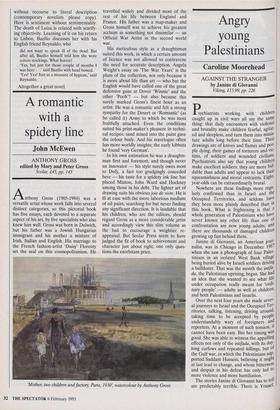A romantic with a spidery line
John McEwen
ANTHONY GROSS edited by Mary and Peter Gross Scolar, £45, pp. 143 Anthony Gross (1905-1984) was a versatile artist whose work falls into several distinct categories, so this pictorial book has five essays, each devoted to a separate aspect of his art, by five specialists who also knew him well. Gross was born in Dulwich, but his father was a Jewish Hungarian immigrant and his mother a mixture of Irish, Italian and English. His marriage to the French fashion-artist 'Daisy' Florenty set the seal on this cosmopolitanism. He travelled widely and divided most of the rest of his life between England and France. His father was a map-maker and Gross himself was to achieve his greatest acclaim as something not dissimilar — an Official War Artist in the second world war.
His meticulous style as a draughtsman suited this work, in which a certain amount of licence was not allowed to contravene the need for accurate description. Angela Weight's essay on 'The War Years' is the plum of the collection, not only because it is more about life than art — who but the English would have called one of the great defensive guns at Dover `Winnie' and the other 'Pooh'? — but also because this surely marked Gross's finest hour as an artist. He was a romantic and felt a strong sympathy for the Desert or 'Romantic' (as he called it) Army to which he was most fruitfully attached. Even the conditions suited his print-maker's pleasure in techni- cal recipes: sand mixed into the paint gave the colour body. And his travelogue often has more worldly insights; the early kibbutz he found 'very German'.
In his own estimation he was a draughts- man first and foremost, and though never an innovator — his style surely owes most to Dufy, a fact too grudgingly conceded here — his taste for a spidery ink line has placed Minton, John Ward and Hockney among those in his debt. The lighter art of drawing suits his obvious joie de vivre. He is ill at ease with the more laborious medium of oil paint, searching for but never finding any significant direction. It is laudable that his children, who are the editors, should regard Gross as a more considerable Artist and accordingly view this slim volume as the bait to encourage a weightier re- appraisal. But Scolar Press seem to have judged the fit of book to achievement and character just about right; one only ques- tions the exorbitant price.
`Mother, two children and factory, Paris, 1930, watercolour by Anthony Gross






















































 Previous page
Previous page